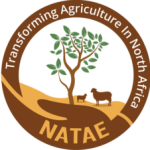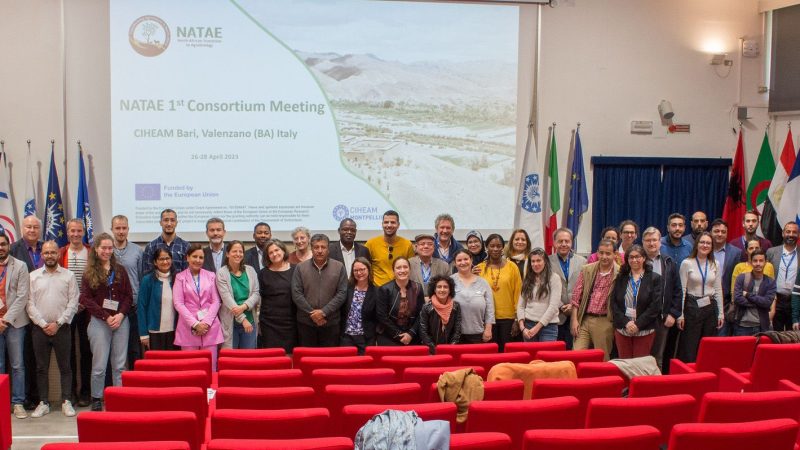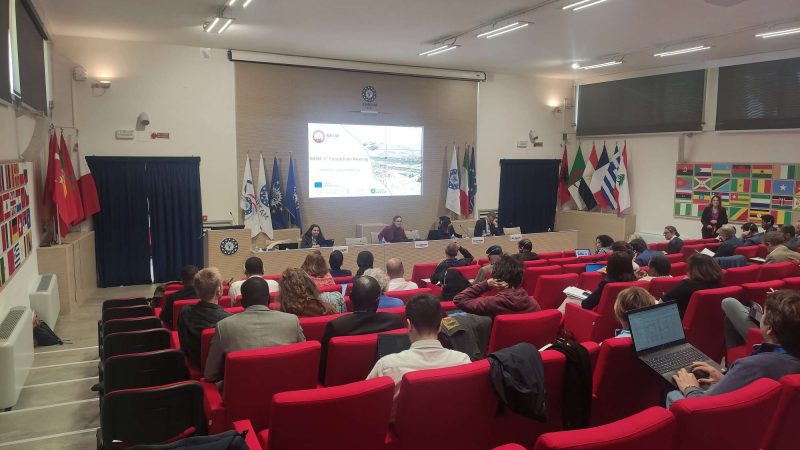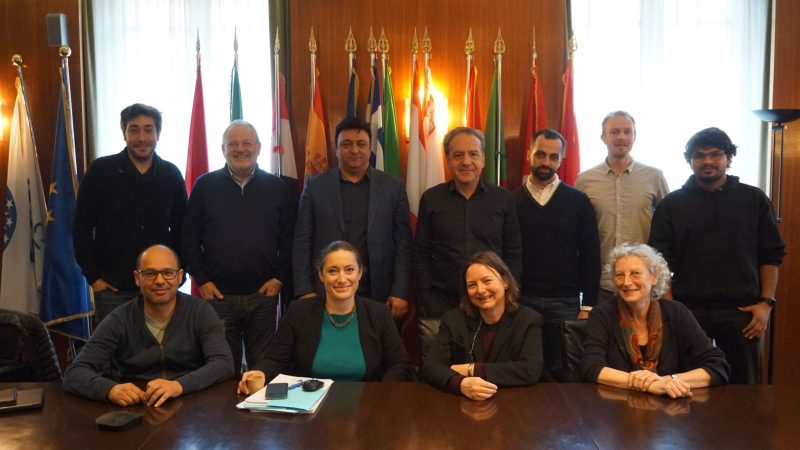Horizon Project NATAE
Project Information
Title: Fostering agroecology transition in North Africa through multi-actor, evaluation, and networking
Acronym: NATAE
DOI: 10.3030/101084647
Start Date: 1 December 2022
End Date: 30 November 2026
Funded under: Horizon – Food, Bioeconomy Natural Resources, Agriculture and Environment
Total cost: € 6.999.185,01
Coordinated by Centre International de Hautes Etudes Agronomiques Mediterraneennes


This project has received funding from the European Union’s HE research and innovation programme under grant agreement No 101084647

About NATAE
NATAE is a four-year project aiming to foster agroecological transition in North Africa. Bringing together a multidisciplinary and multi-actor consortium (research and education institutions, international organizations and local NGOs) from around the Mediterranean, it will identify optimal combinations of agro-ecological practices and develop a replicable methodology to design locally-tailored strategies for AE transitions.
Overview of the Project
Agroecology is increasingly recognized in local and international spheres as a relevant answer to actual and future agricultural, rural and food security challenges. Agroecology is defined as a scientific discipline, a set of agricultural practices and a social movement.
Agroecological transition refers both to a process of dissemination of the most promising agroecological practices at farm level and to the extension of agroecological principles to the whole food system. Five levels of agroecological transition are defined and recognized, from farm to fork.
Agroecology transition can be particularly appropriated in North Africa which is the most food-import-dependent region in the World and a climate change hotspot, and where climate change and population growth forecasts predict an aggravating situation.
The adoption of agroecological practices can in particular allow the improvement of food and agricultural systems’ performances; food and nutrition security; or vulnerable rural populations’ resilience and adaptation to climate change.
The process of agroecological transition is often seen as context specific, but it is also based on transdisciplinary approaches, in which the agroecological knowledge is shared and co-built between the farmers and the researchers and intends to make connection with consumers and therefore food system, through structured dialogue and exchanges in particular with public decision-making and civil society associations.
In this context, the NATAE project (North African Transition to Agroecology) will set 6 living labs in a participatory way so as to characterize, assess and stimulate local stakeholders’ dynamics around the agroecological potentials and constraints for the region. Furthermore, these living labs represent the main relevant agro socio environmental zones of the region: oasian and peri-oasian; peri-urban; mountains; cereals plain; Nile cultivated lands. Last, they are characterized by previous development and research projects implementation in the field of sustainable agriculture bringing in valuable inputs with regards to already existing agroecological practices.
NATAE aims at identifying optimal combinations of agroecological practices (AEP), and developing a replicable methodology to design evidence-based locally-tailored strategies for AE transitions on one hand, at networking through the setting-up of a durable Mediterranean network and community of knowledge: MEDAE. Building on the strength of an exceptional multi-actor and multidisciplinary consortium, NATAE will broadly disseminate its findings, impacting future curricula in North Africa and Europe, future development programs and future policies.
NATAE is a project funded by the European Commission that started in December 2022 and will end in November 2026.
Ethics and protection of personal data is an essential element in NATAE. To ensure compliance of the project implementation with EU best practices and national state policies of relevant countries when applicable, NATAE has appointed an External Ethics Advisor to ensure that all the identified ethics issues are taken into consideration and adequately addressed. Additionally, an Ethics Guideline is being prepared and shall constitute the main document upon which the EU values and regulations are translated to the relevant context of the NATAE project and which will be used by the project partners for guidance and compliance.
Ethics and protection of personal data is an essential element in NATAE. To ensure compliance of the project implementation with EU best practices and national state policies of relevant countries when applicable, NATAE has appointed an External Ethics Advisor to ensure that all the identified ethics issues are taken into consideration and adequately addressed. Additionally, an Ethics Guideline is being prepared and shall constitute the main document upon which the EU values and regulations are translated to the relevant context of the NATAE project and which will be used by the project partners for guidance and compliance.
Objectives
-
(SO1) To Comprehend
● To identify promising agroecological practices combinations
● To analyze stakeholders’ knowledge and perceptions on agroecology
-
(SO2) To Assess
● To measure the qualitative and quantitative impacts of AE strategies for different farming systems
● To identify levers and constraints for the AEP diffusion and conditions, means and tools to support agroecological transitions
-
(SO3) To Enlarge
●To broaden agroecological value chains
● To strengthen market access strategies for small producers and to enhance consumers' demand for agroecological food products
-
(SO4) To network
● To set up a Mediterranean multi-actor network on AE, fostering knowledge exchange across different communities
-
(SO5) To Empower
● To empower key stakeholders in charge of policy elaboration and higher education to foster agroecological transition
Photo Gallery

This project has received funding from the European Union under grant agreement No 101084647. Views and opinions expressed are however those of the author(s) only and do not necessarily reflect those of the European Union or the European Research Executive Agency (REA). Neither the European Union nor the granting authority can be held responsible for them.


